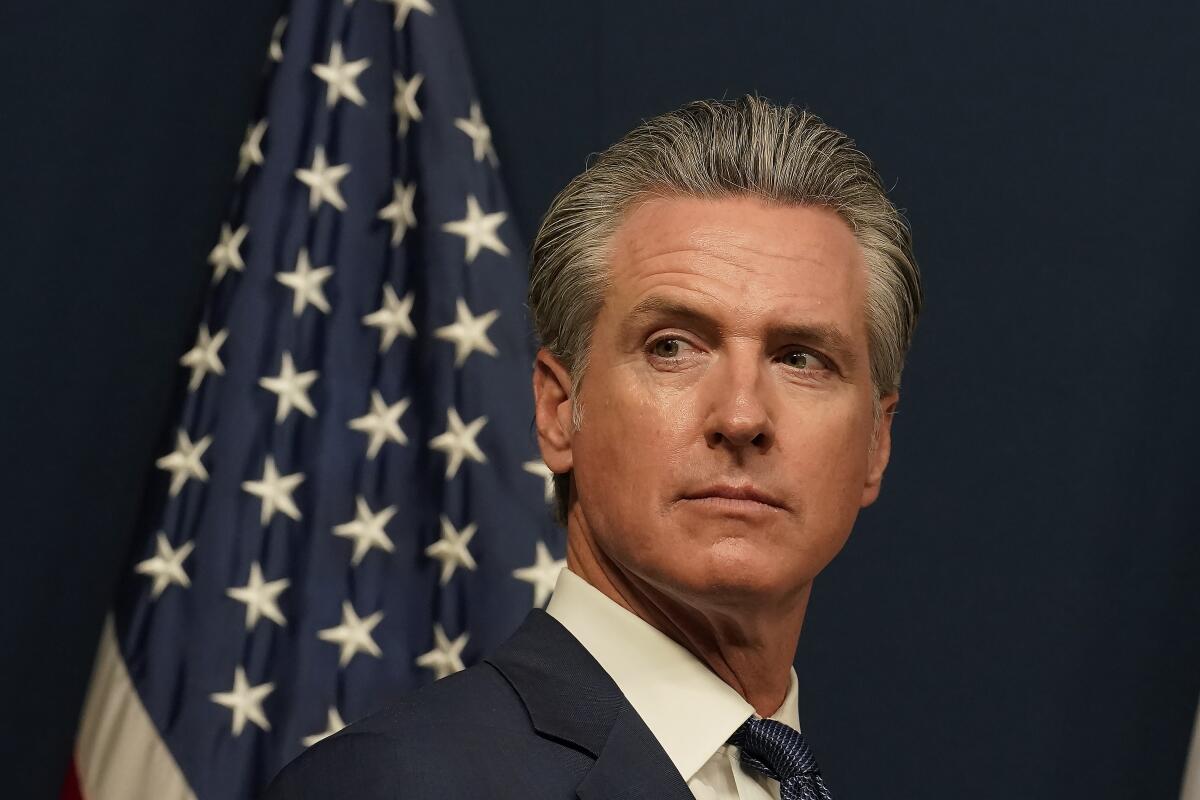Bill to study inequalities in youth sports, attacked by critics as supporting transgender athletes, signed by Newsom
SACRAMENTO — Gov. Gavin Newsom on Monday signed legislation to study inequalities in youth sports, a move likely to draw ire from Republicans who believe the measure is intended to support transgender athletes.
The legislation, Assembly Bill 749, creates a commission to examine whether a new state board or department is needed to improve access to sports regardless of race, sex, sexual orientation, gender identity, disability, income or geographic location.
In an open letter last month to the governor, Senate Minority Leader Brian Jones (R-Santee) zeroed in on the term “gender identity.”
“The author and supporters of [this legislation] know if they were upfront and put forth a straightforward bill allowing biological males to compete against young women and girls, it would be easily defeated,” Jones wrote on Sept. 26. “So instead they are trying to establish a stacked commission to indirectly rig the issue in their favor.”
Jones urged Newsom to veto the bill and referenced the governor’s previous remarks about transgender athletes. During the first episode of his podcast “This Is Gavin Newsom,” the governor — a longtime ally of the LGBTQ+ community — acknowledged the struggle faced by transgender people but called transgender women’s participation in women’s sports “deeply unfair” and warned it was hurting Democrats at the polls.
Assemblymember Tina S. McKinnor, who introduced the bill, said Jones should keep his focus on Washington.
“Senator Brian Jones’ time would be better spent writing to the Republican controlled Congress to end the Trump Shutdown and reopen the federal government, rather than attacking trans students,” McKinnor (D-Hawthorne) wrote in an email to The Times.
Legislation referencing gender identity tends to be a lightning rod for controversy nationwide, with opinion polls suggesting Americans hold complex views on transgender issues.
A survey conducted this year by the nonpartisan Pew Research Center found 66% of U.S. adults favor laws requiring transgender athletes to compete on teams that match their sex assigned at birth. At the same time, 56% of adults supported policies protecting transgender people from discrimination in jobs and public spaces.
During legislative committee hearings on the bill, McKinnor focused on the legislation’s potential racial impact. She said last year’s Play Equity Report found 59% of white youth participated in structured sports programs, compared with 47% of Black youth and 45% of Latino youth.
“Participation in youth sports remains unequal despite the well-documented physical, mental and academic benefits,” McKinnor told the Senate Health Committee in July. “These disparities stem from systemic barriers such as financial limitations, uneven program quality, outdated physical education standards and the lack of a coordinated statewide strategy.”
More than two dozen organizations endorsed the bill, including the Los Angeles Rams, city of San Diego, USC Schwarzenegger Institute, YMCA of Metropolitan Los Angeles and the Boys and Girls Clubs of West San Gabriel Valley and Eastside.
The legislation directs the state public health officer to convene the commission, which will be composed of 10 members appointed by the governor and three appointed by each the speaker of the Assembly and the Senate Committee on Rules. The health officer will also sit on the panel, or appoint their own designee.
Newsom did not issue a statement when his office announced a slate of bills he signed on Monday.
In March, Newsom infuriated the progressive wing of his party when, while hosting conservatives commentator Charlie Kirk on the governor’s podcast, he broke away from many Democrats on the issue of transgender athletes. Newsom, an outspoken champion of LGBTQ+ rights since he was mayor of San Francisco, publicly criticized the “unfairness” of transgender athletes participating in women’s sports.

